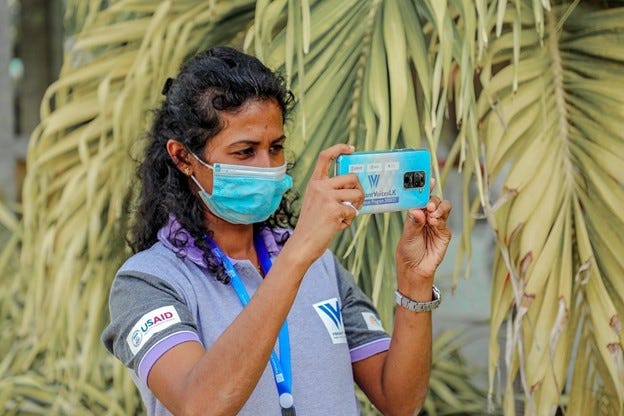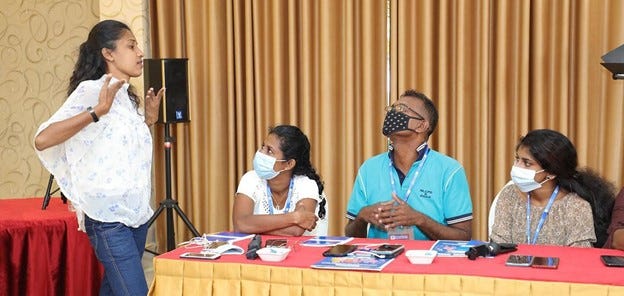A Sri Lankan Woman Turns Her Disability into a Silver Bullet
Making history and building inclusivity as Sri Lanka’s first female sign language reporter

Suranga Udari, a 32-year-old woman from Ahangama, in Sri Lanka’s southern district of Galle, is not one to let life’s challenges stand in the way of fulfilling her childhood dream of becoming a journalist.
Recently, she made history by becoming Sri Lanka’s first female reporter to use sign language on camera to produce a news story on the improper disposal of face masks on the southern beach in Galle. The production, entirely in Sri Lankan Sign Language, was telecast on weekly news magazine MediaCorps Watch in January.
Born to a family of five children, Suranga and two of her siblings live with hearing impairments. “Growing up was incredibly difficult. However, I was determined to overcome all obstacles,” says Suranga. She attended a school that was for “abled” children, and was expected to compete with her peers as she left school and began looking for work.
However, after completing her formal education, Suranga could not find employment in any of the local media houses. She had two options: watch her childhood dream shatter into pieces or pursue her dream come what may. She chose the latter.
For seven years, she worked as a graphic designer at the Sri Lanka Central Federation of the Deaf (SLCFD), a local organization that focuses on the deaf community. In September 2024, she was nominated by SLCFD to participate in a five-day intensive residential training camp conducted by Vibrant Voices, a program supported by USAID that provides relevant tools and skills to those working on behalf of marginalized communities to tell their stories.
Following the training, Suranga received a toolkit consisting of a smartphone, tripod, microphone and other equipment necessary to produce online stories. Suranga and other participants took all they acquired from the training to produce local stories about their communities through mobile storytelling.
“I did not have any experience in this field. But I picked up the skill fast, with a lot of help from the mentors,” she said. “Now I want to use this skill to bring some light to the deaf community, by talking about problems they face.”
After her first-ever news report, which was presented entirely in sign language, Suranga was offered a job at Sirasa TV News, one of Sri Lanka’s leading media organizations that typically reaches more than 15 percent of audience share.
According to the 2012 census, more than 400,000 hearing-impaired persons live in Sri Lanka. They face numerous challenges, including access to a quality education, equal employment opportunities, and even driver’s licenses. Sign language has also not kept up with global technological advances and there is a dearth of trained sign language specialists in the country. For the hearing-impaired, it is often a struggle to express themselves and to be heard.
The Vibrant Voices program used mobile storytelling to bridge such gaps. More than 60 people from at least 20 different organizations have participated in the program.
“I am so thankful for the opportunity to widen our space to create our own content with our own language,” said Brayan Kodhthuwakku, the president of SLCFD. “With this exposure, the deaf community will be able to report quality news. Moreover, we think this will be a great way to advocate for their rights.”
This has been a milestone of a lifetime for Suranga. It has also brought a beacon of hope to the deaf community in Sri Lanka, paving the way for an inclusive culture in media and potentially pioneering a new wave of opportunities for them.
For Suranga, everything seems to have fallen into place following this one training — her childhood dream job, her career, and her role in society. They are no more mere dreams but dreams that became realities.
About the Author
Passanna Gunasekera is a Program and Outreach Specialist at USAID’s Mission in Sri Lanka and Maldives. The USAID-supported, IREX-implemented Media for a Democratic Sri Lanka initiative also contributed to this story.




























